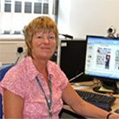Patient and public involvement and engagement (PPIE) group
On this page:
PPIE group members
Catherine Irwin
 I was diagnosed with rheumatoid arthritis over 8 years ago, and my involvement with the Patient Advisory group has enabled me to understand my condition more. I am more aware and up to date with the support and research available to RA patients.
I was diagnosed with rheumatoid arthritis over 8 years ago, and my involvement with the Patient Advisory group has enabled me to understand my condition more. I am more aware and up to date with the support and research available to RA patients.
Being a fellow sufferer, I have found that my contributions are based on having the disease and, in turn, this will help others to access information available and get the support and understanding of their own condition, including ways to improve their wellbeing.
Dorothy Slater
I have suffered from rheumatoid arthritis for about 10 years now. I have found that patients involved in these research studies can add very personal experiences, which the researchers don’t have.
I do believe that being a patient partner in these type of groups helps to improve knowledge about how Rheumatoid Arthritis effects different people from different walks of life, making it possible to improve clinical care for all sufferers, of all ages.
Golda Gibson
 I was diagnosed with rheumatoid arthritis and interstitial lung disease 10 years ago. After the initial shock, I joined the REMORA study, helping them keep a record of how they are feeling on a daily basis.
I was diagnosed with rheumatoid arthritis and interstitial lung disease 10 years ago. After the initial shock, I joined the REMORA study, helping them keep a record of how they are feeling on a daily basis.
I wanted to be a voice that spoke for patients, to highlight the daily difficulties RA patients experience, and that researchers and clinicians have minimal understanding of. Daily monitoring of our condition means that when we get that important face-to-face appointment, we’ll never again come away annoyed that we had forgotten something important.
John Paton
 I am a patient ambassador in Scotland for the National Rheumatoid Arthritis Society (NRAS), and a Patient Research Partner in the PPIE Group of the REMORA2 project.
I am a patient ambassador in Scotland for the National Rheumatoid Arthritis Society (NRAS), and a Patient Research Partner in the PPIE Group of the REMORA2 project.
Supporting research is one of the ways patients themselves can help others to live better with inflammatory rheumatic conditions, and improve the care we receive.
Karen Staniland
 I am a patient with rheumatoid arthritis and a patient partner in the PPIE group for the REMORA study.
I am a patient with rheumatoid arthritis and a patient partner in the PPIE group for the REMORA study.
I believe that patient involvement in research studies adds a vital ‘lived experience’ dimension that researchers don’t have. I strongly believe that being a patient partner adds to our knowledge and helps turn a negative situation into a positive experience and, ultimately, has the potential to improve clinical care for us all.
Nigat Ara
I wanted to join the PPIE advisory group to learn more about different ranges of rheumatoid arthritis and its impact in the REMORA study. I wish to contribute towards the purpose and barriers that participants may have around symptom tracking, to improve patient care.
By engaging with diverse communities and patients, I believe the REMORA study can help to engage people in a unique way to enhance their quality of life.
Paul Amlani-Hatcher
 I live in London. I am a patient with rheumatoid arthritis and a patient partner in the PPIE group for the REMORA study.
I live in London. I am a patient with rheumatoid arthritis and a patient partner in the PPIE group for the REMORA study.
I believe that patients can add great value to research studies and that the interaction between patients and researchers can be extremely beneficial for all parties going forward.
Roopa Mohan
I’m a counselling psychologist and mental health nursing assistant by vocation.
Being part of REMORA2 helps my clinician in understanding the disease pattern, identifying probable triggers and better management of RA condition I am living with, that would further help in planning my treatment. It also gives me a sense of control in self-management.
Uta Gomes
As a person experiencing chronic illness, I was keen to share my experience and how I thought it may impact on and be relevant for REMORA.
My motivation to be part of the patient advisory group was to learn more about the REMORA study and its setup, and how my involvement might be useful to improve quality, relevance and effectiveness of the research project.
I was also keen to learn how apps and social media can potentially help patients and doctors improve patient care.
